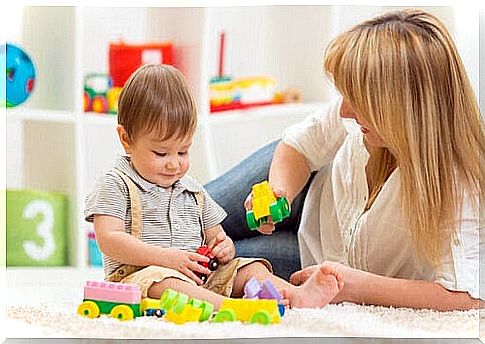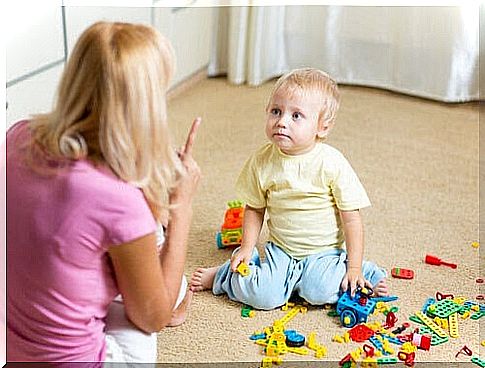It’s Good To Let Children Make Mistakes

Parents often want to monitor and control their children because they believe it will make things easier for them and give them a better life. But letting your kids make mistakes is actually just fine. It gives them the chance to handle situations on their own and learn to solve different problems.
No one is born into the world with all the knowledge. Making mistakes is an important part of growing up. Every human being must go through this very important process to develop emotional resilience. It also helps individuals develop a variety of other skills.
The truth is that many parents have a tendency to ask themselves when to intervene and when it is better not to do so. It is best to keep things in balance. Parents should guide, give advice and support to their children.
But if parents go too far and act as crutches for their children, it can actually be harmful. Overprotected children develop low self-esteem and develop a learned helplessness.
All children will experience moments when they can not get a toy to work the way they want. Or maybe they have a hard time carrying out an everyday task. This is when the parents need to learn when to let the child keep trying, and when it is better to help them.
For many mothers and fathers, it can be difficult to determine. But it is not impossible as long as you are respectful.
Autonomy and independence
There are two different types of autonomy. The first has to do with physical development: our motor skills and ability to coordinate our movements. The second aspect is psychological. It is about expressing one’s desires and understanding of one’s own actions.
Raising children is a process in which they must achieve independence in its broadest sense.
In fact, some parenting practices promote overprotection. When we try to prevent our child’s suffering completely, we only stand in the way of their growth and overall development.
Encouraging autonomy in children is extremely important. It is the key to educating competent and strategic adults who can take on life. The formation of these patterns begins during childhood.

How to promote autonomy in children
There are several factors that prevent parents from letting their children make their own decisions. The most obvious is the fear that they will make a mistake. No one wants to see their children sad and disappointed, but this is a form of overprotection.
For other parents, it is a matter of control. They want their children to do exactly what mom and dad think is right. It can come from a fear of being criticized by others. It can also come from a parent’s guilt when a child fails.
At the same time, life is structured around time-consuming routines. When parents have too much to do, they have little time left to teach their children to do things on their own.
Teaching your children something takes time and patience, and there is often a lack of both in today’s reality. Often it is simply more convenient to do things for our children.
None of these reasons are valid or valid. Letting your children make mistakes is an indispensable exercise that prepares them for life
So how do you let your kids make mistakes?
First and foremost, parents need to be aware that when children start doing things on their own, they will inevitably make mistakes. And of course, they will be frustrated.
Frustration is not a bad thing at all. It is rather an opportunity to surpass oneself and set new goals. But it is not easy to come to that conclusion on your own. It is our job as adults to incorporate these values.
Endurance
When children want to help with household chores, for example, it is good to accept their help. And encourage them too, of course. If your child makes a mistake, encourage him to try again. Your child needs to learn to understand that it is completely natural and normal to start over and try again.
If the parents themselves show perseverance and show that they know how to handle their own frustration, the children learn to do the same. In the long run, this is the best way to guarantee a child’s future happiness.
Patience
After several failed attempts to do something, a child is likely to start crying or have an outburst of rage. The parent’s first impulse is to solve the problem so that the child stops crying. A better alternative, however, is to sit down with the child and look for possible solutions together.
Reasonable goals
A child’s learning process goes through different steps and stages. The goals you set for your child must be realistic, in relation to your child’s ability and maturity.
It allows your son or daughter to achieve their goals. In this way, you help to strengthen your child’s self-esteem and encourage him or her to learn new skills.

Household chores are a good tool
Helping with different things in the home teaches a number of positive values. It promotes cooperation, integration and shared responsibility. It also builds autonomy and prepares children to do things on their own in the future.
Allow your children to cry
It can be hard to see your children crying. It’s never easy to let them make mistakes. But it is important that we allow our children to express their frustration, fear and anger. You should not become desperate and diminish or suppress your child’s feelings.
You can always talk to them at a later time to help them channel negative emotions and learn to move on. Banning tears is never good, nor is it good to diminish what they go through.
Let your children make mistakes so that they, step by step, become independent and learn to face life on their own.









